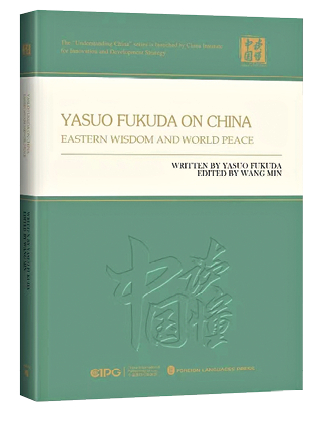
Yasuo Fukuda on China: Eastern Wisdom and World Peace
Author: Yasuo Fukuda
Paperback, 184 pages
Published by Foreign Languages Press
Yasuo Fukuda and his father Takeo Fukuda were the first father-son pair in Japanese history to serve as prime ministers, and they were also firsthand witnesses to the signing of the China-Japan Peace and Friendship Treaty in 1978, a concrete implementation of peaceful diplomacy.
Yasuo Fukuda on China: Eastern Wisdom and World Peace compiles articles and speeches by Yasuo Fukuda on various occasions, covering a wide range of topics, from China’s opening up and robust economic growth to strategic and mutually beneficial China-Japan ties, China’s relationship with the rest of the world, and China’s vision and practice of building a global community of shared future.
Yasuo Fukuda describes his decades-long bond with China and his strong belief in world peace from the perspective and with the tone of an old friend.
The first chapter, “Wisdom of the East – The Governance of China,” describes how many Japanese are familiar with the Confucian classics from an early age. On September 26, 2020, the oldest manuscript of Annotations to the Analects of Confucius, which dates back to the 6th-7th century, was found in Japan, indicating Confucius’s deep-rooted place in Japanese society. As a philosophy and belief system of ancient China, Confucianism advocates ancestor worship and practicing human-centered virtues for living a peaceful life, which Fukuda and his father also advocated.
In the second chapter, “Towards the Same Goal – Cooperation for Mutual Benefit,” Fukuda, a farsighted political leader, indicates that the key to building a friendly relationship between China and Japan lies in whether both sides can think from each other’s perspective, that is, to follow the golden rule of Confucianism – “Do not do unto others what you would not want others to do unto you.” Taken from the Analects of Confucius, it has now been widely accepted and recognized by the international community.
In 2008, the two countries issued the China-Japan Joint Statement on All-round Promotion of Strategic Relationship of Mutual Benefit. Yasuo Fukuda was then the Japanese prime minister and saw China’s development as an opportunity for Japan.
China’s four decades of reform and opening-up have also witnessed China-Japan economic and trade cooperation and extensive communication. Geographically, Japan and China are neighbors and have very close cultural ties. Both sides must abide by the spirit of peaceful development and avoid conflict in the future. This is the mission of both Japan and China, he writes.
The peace-seeking wisdom of moderation and how Confucianism makes the world a better place is the subject of the third chapter, “Thriving Together – Harmony and Peace.” Fukuda says Eastern wisdom has profound significance in addressing today’s global challenges. Faced with the severe international situation, China and Japan should not only develop friendly relations, but also draw Eastern wisdom from Confucianism to resolve disputes, and work together to become an important force in maintaining world peace.
Yasuo Fukuda also served as the chairman of the Boao Forum for Asia from 2010 to 2018. During his tenure, he lauded the China-proposed Belt and Road Initiative (BRI), calling it a vivid practice of the concept of building a global community of shared future. He points out that the BRI and the Asian Infrastructure Investment Bank emerged at a time when China was developing rapidly and achieving remarkable results. The BRI especially aims to share China’s development opportunities with the rest of the world.
The BRI, he underscores, is the embodiment of globalization. At its start, the Boao Forum for Asia was a global forum focusing on Asia and emerging economies, attended by representatives mainly from China and other Asian countries. Over the past decade, it has made great progress in regional economic integration, helped Asian countries achieve their development goals, and contributed to enhancing mutual understanding among Asian people. Today, it has become a high-level platform for dialogue on important Asian and global issues between government officials, influential business leaders, and academic leaders from Asia and other continents.
“Review the old and learn the new” is another famous saying of Confucius, which is also widely known in Japan. But it is not enough to just know the new; one must also innovate and create. And this is what China has been doing. In the last chapter, “Peaceful Development – A Shared Future,” Fukuda discusses China’s proposal of building a global community of shared future, which is a pacifist concept.
He says he has the Chinese, Japanese, and English versions of Xi Jinping: The Governance of China in his office. In the book, Chinese President Xi Jinping expounds his ideas about peace and a global community of shared future. According to Fukuda, it is an international responsibility that China and Japan must shoulder to help other countries achieve win-win results.
Young people are the hope for the future. Fukuda is delighted to hear that his alma mater, the private Waseda University in Tokyo, signed an academic exchange agreement with Tsinghua University in 1996, and since then, the two universities have been carrying out student exchange programs.